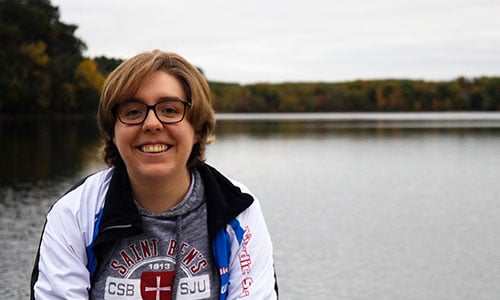CSB graduate Thwaites '19 to study Earth's magnetosphere
May 28, 2019
By Mike Killeen

Jessie Thwaites (photo by Shannon Govern ’19)
Editor’s note: This feature story on Jessie Thwaites '19 is the first of six feature stories that will appear this summer on the College of Saint Benedict and Saint John’s University website featuring graduates who received awards from the Fulbright U.S. Student Program.
Jessie Thwaites was a senior at ThunderRidge High School in Highlands Ranch, Colorado, when NASA launched the Magnetospheric Multiscale Mission (MMS), an unpiloted space mission to study the Earth's magnetosphere, on March 13, 2015.
Little did she know that just over four years later, she would be studying data from the mission.
Thwaites, who graduated summa cum laude from the College of Saint Benedict May 11 with a degree in physics, received an Austrian Fulbright-Marshall Plan Award for research in Graz, Austria. She will work at the Austrian Institute for Space Sciences (Intitut für Weltraumforschung, or IWF) and will be in Graz for nine months, beginning in September.
She is one of six CSB and Saint John’s University graduates to receive a Fulbright Award for 2019-20, but the only one to receive a Fulbright Research Award.
“MMS is a set of four spacecraft that fly in formation in orbit around Earth to take data about magnetic reconnection in the magnetosphere, which refers to Earth’s magnetic field region of influence,” Thwaites said.
“Magnetic reconnection is a fundamental process, which occurs throughout space that has never been observed in space, so this mission aims to capture this process as it is happening to give physicists a more full understanding of the process itself.”
A group headed by Dr. Rumi Nakamura at IWF designed and implemented instruments on MMS.
“During my stay with her I could be working with data collected by these instruments,” Thwaites said.
“Dr. Nakamura and her group are at the forefront of the work being done by MMS, and IWF is the largest non-American partner in that mission,” Thwaites added. “This would enable us to better understand the typical conditions of plasma in the magnetosphere.”
All those factors led Thwaites to apply for the Fulbright research award.
“I applied for a Fulbright because it offers an excellent experience doing research internationally,” Thwaites said. “Science is increasingly becoming a global community, and I believe it is important to develop connections within the international community.”
Her time in Austria is not entirely about research. It’s her second visit to the European country as she studied abroad in Salzburg, Austria, during her sophomore year at CSB.
“Outside of research, I am most excited to be immersed in Austrian culture,” Thwaites said. “I am very excited to go to cultural festivals and meet Austrian people, as well as improve my German skills while in Austria.
“This award is very important to me. It is both a recognition of the work that I have done as undergraduate at CSB and SJU, as well as providing me with countless opportunities in the future,” Thwaites said.
Those connections will help Thwaites as she prepares for a career as a physicist.
“In the future, I will be working with international groups and attending conferences with my international colleagues, and this opportunity would allow me to strengthen international connections in space research,” Thwaites said.
CSB and SJU students interested in applying for a Fulbright Award for the 2020-21 academic year should contact Phil Kronebusch, professor of political science and coordinator of competitive fellowships at CSB and SJU, or Lindsey Gutsch, Program Coordinator for Undergraduate Research, Competitive Fellowships and First-Year Experience.
